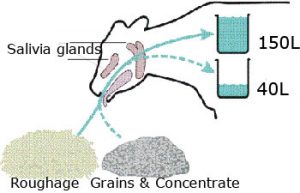
From Feed to Manure: How to Optimize the Chain to Ensure Cow Health and Production
Introduction
The farmer must consider that the quality of feed is one of the major factors in the maintenance of cow health. Balanced feeding is not the only key to health but would also determine the profit from the operation. Even for a veterinarian consultant, it is important to evaluate cow health and feeding practices during scheduled or clinical visits to the farm. There are two ways to assess general health and adequacy of nutritional status. The first one is evaluating Body Condition Score It is a way to score the physical condition of a cow based on visual examination. of the cows in different physiological and states and the second quick and easy method is manure evaluation to understand digestive efficiency.
Cow Dung Examination
The manure or dung is the last product of digestion voided out hence available to examination. It indicates the interaction between feed, rumen, and the digestive tract. In this blog, I will discuss basic principles on the feeding of cows.
Grass/forages are natural feed of cows:
A cow’s diet ideally should consist of good and chewable fibre to allow increased secretion of saliva resulting in rumen buffering. Generally, the farmers have a myth that a feed that is eaten fast and readily by a cow is a good feed. It is not true. A cow should not finish the feed fast-chewing but should masticate the grass and the feed. Most of the fibre component of the grass is digested by anaerobic fermentation in the rumen. It depends on two critical factors:
(a) the post-chew particle size, and (b) anaerobic buffered rumen environment allowing the rumen bacteria to digest. In case fibre is not digested in rumen and pass-through to large intestine, it would be aerobically fermented resulting in gas production and acids, which leads to loss of nutrients and change in dung consistency.

Ideally, a cow should eat a small portion of feed 8-10 times in a day. When cows are fed only twice a day, it affects chewing efficiency and loss of nutrients. Cows should have access to feed throughout the day and spend a minimum 12 hours in chewing and ruminating. Cows should also have constant access to water. The fermentation process dehydrates cows within 4-6 hours which causes impaction. For the proper attack of rumen bacteria, the feed particles should remain in the rumen for a longer period which depends on the availability of grass mat. In order to maintain robust grass mat, it is necessary that cows are given long-staple dry grass around 1 kg daily as the first feed. This will also enhance salivation due to the long chewing period. Rumen buffering is important as with digestion of fibre volatile fatty acids are constantly produced. The best buffering system is cow saliva secreted throughout the day. Nothing can replace natural saliva. The feeding practice, therefore, should induce profuse salivation. A cow on grain ration will produce less (around 40L) saliva whereas a cow on the fibrous diet will be able to secrete up to 150 L saliva daily. For producing so much saliva cows must drink enough water. Cows drink around 150 L water daily, provided it is clean and of normal temperature. The deficiency of water and salt also reduced saliva secretion.

These principles should guide you in setting up a farm with good feeding practices. The next post will discuss how manure can be examined for digestive efficiency.
Forages or grains
Can a cow be maintained only on forages? The reply will depend on the production level of the cow and the quantity and quality of forages available. The basic principle is that a lactating cow should receive enough energy through the feed to maintain its health as well as production demands. Nowadays two important factors are considered:
- Dry matter fed to the cow as it will decide satiation and
- The energy density of the feed. If energy and dry matter requirements can be met from forages, there is no need to feed grains or concentrated feed. When good quality silage (a mixture of grain and legume silage) is available, up to 15 kg L milk there is no need to feed concentrate feed. In order to maintain rumen health from 0.5 to 1.0 kg grains can be supplemented.
In subsequent blogs, I will discuss manure examination to assess digestion efficiency.
Read: From Feed to Manure: How to Optimize the Chain to Ensure Cow Health and Production – Part 2
